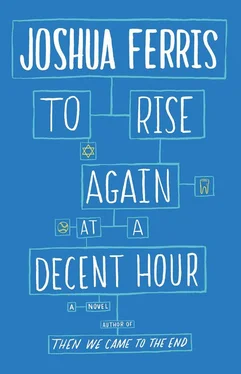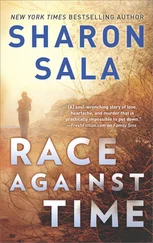He began to call things by their proper names: not “church” but “temple,” not “Old Testament” but “Torah.” He changed out of his street clothes and bought a plain black suit. He stopped shaving. He wore a kippah, and later the tallit katan . After she graduated from high school, she worked for her uncle in the office of the grocery store, while he spent his days reading Torah and the commentary. He proved to be a quick study. One day he greeted her in Hebrew. He had changed rabbis — he was now studying with Rabbi Repulski of Temple Elohim, who was a better fit and who talked to him about Israel. He was fascinated with the country, wanted to visit, wanted to live there. He couldn’t comprehend how it had willed itself into being in such short order. But that’s what happens, he supposed, when you lose six million people in a holocaust.
“It’s like how you drive down the highway,” he said, “and you see this enormous thing tied down to a big rig, with the sign on back, you know, that says OVERSIZE LOAD, and it’s hard to believe, but as you get closer, you realize, that’s a house they have on that truck, an actual house, and they’re driving it down the highway! That’s Israel — the house they drove down the highway.”
“I haven’t seen one of those,” she said. She had never once, even in Los Angeles, been on a highway.
A few days later, after more study, he said to her, “But, Mirav, the Holocaust wasn’t the reason for the state of Israel. Israel got started a lot earlier than that. And not even as a religious movement. It was secular Jews, intellectuals, who saw the importance of it. They knew haskalah was a death sentence. Do you know about haskalah? It was guys like Moses Hess who started Israel — Hess and Pinsker and Herzl.”
She had heard of Herzl, but not the others. She had spent seventeen years under the tutelage of Osher Mendelsohn, but in a matter of a few short months, Grant Arthur knew more history than she did.
“The fact of the matter is,” she said to us thirty years later in the commons room, “the man was brilliant. I honestly think he was fluent in Hebrew in six months. I was simply amazed by that, and I remember saying so, and I remember his reply. He said, ‘If Ben-Yehuda can invent it in a year, I can learn it in six months.’ He had been to exactly one Shabbat dinner in that time.”
She couldn’t invite him over. She couldn’t introduce him to her parents. No matter how long he studied Torah or how well he mastered Hebrew, he would never be a Jew. The liberals, the congregations with mixed seating, they could convert him. But in the eyes of Osher Mendelsohn, the rabbi of Shalom B’nai Israel, a man of tradition, with a long memory of Europe’s madness, and born into that generation when the chasm between Jew and non-Jew had never been greater, Grant Arthur would never be a Jew, because he hadn’t been born a Jew.
One day Grant Arthur said to her, “I’m going to become a rabbi.”
By then she had entered the house. She had seen his bedroom (from the doorway only) and the mattress that lay on the floor. There was a white sheet thrown over it. That sheet was the only sheet, that mattress the only bed. He had a lawn chair in one room and a beanbag in the other, some mismatched dinnerware. The cabinets were bare, the closets were empty. She could manage to adjust only slowly to the evidence before her eyes that this was how a person her age might live. Without linens, without china, without furniture, without siblings, without a dozen cousins always in the kitchen. The curious maturity of his owning a home coupled with his complete ignorance of how to properly make one could bring tears to her eyes in an offhand moment. So it was left to her to smuggle in what little touches the house would acquire: lace curtains, a menorah for the mantel, a coverlet, a serving bowl, a pair of matching wineglasses. For her trouble he cried and kissed her. He had never been loved, he said, and she expected some addition or qualification, but that was it: he had never been loved. She cried and kissed him. Whenever she left him in that house, that set of rooms, in that hermitage of books, she took with her the rhythm of his breathing. It was the closest she had ever come physically to someone else; it felt as if he were breathing from within her.
It was the house with nothing inside until one day she walked in to find a painting on the wall mounted in an ornate frame. It was a Marc Chagall. There was a cow and a fiddle, goats’ heads, a dark blue sky, the moon and its halo, a knockabout set of curving, teetering, upsloping houses, a fallen chair, a curled-up woman on a cloud. She knew nothing about painters or their schools or styles, but she knew Marc Chagall. She knew him from her father. She also knew that Marc Chagalls lived on the walls of museums.
“What’s it doing here?” she asked.
“Do you like it?”
“Is it real?”
“Of course it’s real.”
“Where did you get it? What did it cost?”
“My grandmother bought it,” he said. “Well, my grandmother’s dead. But I used the money she left me. Do you think your father will like it?”
He had, said Mirav, trying to express the shock of walking in and seeing an original Chagall, about fifty dollars in furnishings scattered around that house and then a priceless work of art on the wall. She knew he was unusual; she hadn’t known he came from such crazy wealth. His father was a lawyer in Manhattan, and his mother was a socialite. He hadn’t spoken to either of them in over a year.
“He was very heavy into the history by then,” she said. “The shtetls, the Pale. Cossacks and Tartars. He was deeply affected by them in a way I found hard to understand. They filled him with revulsion, and with pity — and with something… I think the word might be romance. Not for Jewish persecution, I don’t mean to suggest he romanticized that. But he had a strange affinity for that time. I think the Chagall was his way of owning part of it.”
And of impressing her father. By then he had spoken to Rabbi Blomberg of Yad Avraham about going to seminary after his conversion. He was keeping kosher, observing the Sabbath, and following the 613 mitzvot maintained by traditional practicing Jews. He thought that his conversion and his course of study, his sympathies and his Chagall, would prove his devotion to the man he wanted for a father-in-law. He may not have been born a Jew, but even among the Orthodox, according to the law, a convert was an equal in the eyes of God.
“But it doesn’t matter what the law says,” Mirav told him, “or what’s right in the eyes of God. He’s not going to approve.”
They were sitting at the far corner of a dining room table that had been recently delivered, made of cherrywood and large enough to hold sixteen, upon which he had promptly rested not only the menorah but the dream of a thousand Sabbath dinners, with his bride beside him, and all his court.
“So to God, and the state of Israel, I qualify as a Jew, but to Rabbi Mendelsohn, father of Mirav, I was born a Gentile and a Gentile I will die? It doesn’t make any sense, Mirav. Does the man have no respect for Halakhah?”
“Halakhah! But you aren’t listening, Grant. It has nothing to do with the law. You want to marry his daughter. His daughter. My father will want that man to be born a Jew. And if you want the law to weigh in, I guarantee you he will quote the mitzvah that forbids intermarriage with a Gentile.”
“I’m no longer a Gentile,” he said.
“Until you go before the Beth Din,” she said, “you’re a Gentile.”
It had been almost a year, and while he was not yet a Jew, he had the beard of one greatly devout, covered his head everywhere he went, and had had himself circumcised. He spoke as if he had been one all his life, a life whose sole purpose was its devotion to Judaism.
Читать дальше












